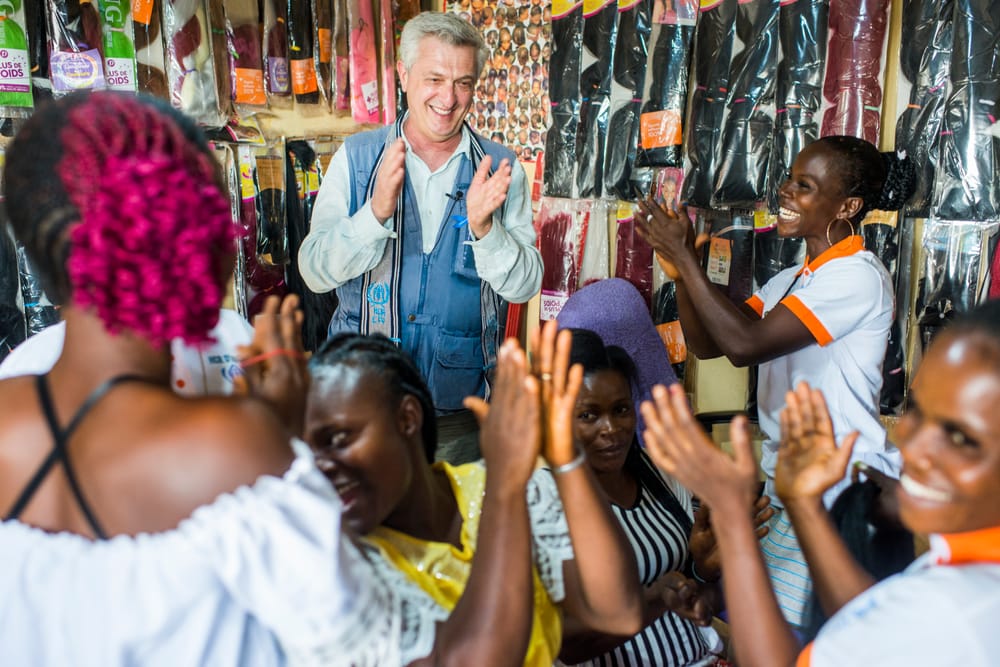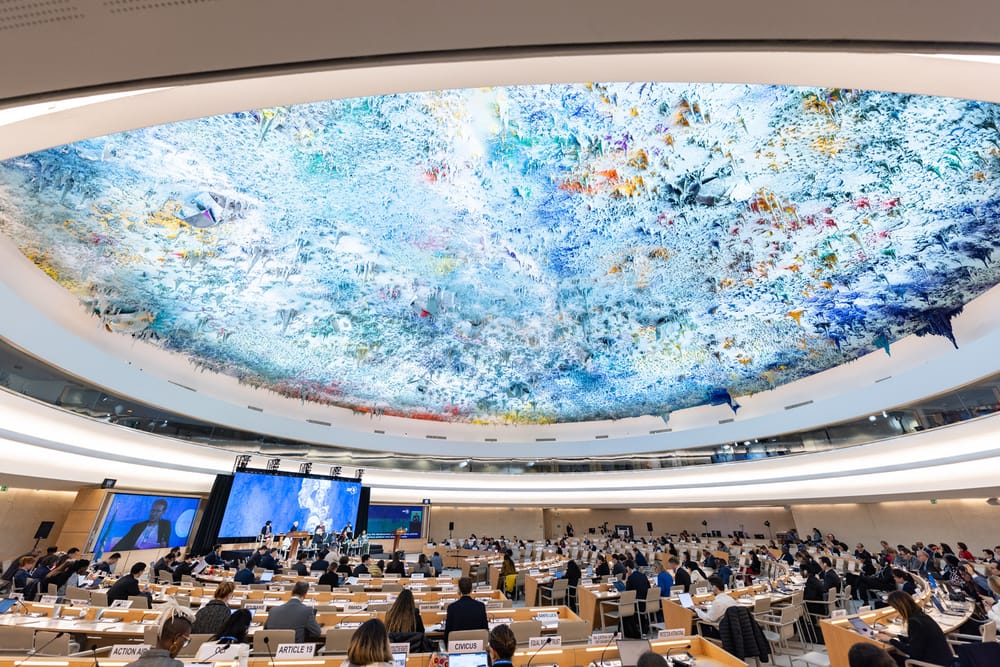By Filippo Grandi
In recent months, whenever I have tried to outline the challenges of human displacement, I have found myself reciting a catalogue of conflicts and catastrophes. But it is the dawn of a new year, and so I shall instead strike a more positive note by reflecting on December 2023 which proved that there does exist a community of people – one would even call it a movement – dedicated to peace, compassion and humanitarianism.
The Global Refugee Forum
In the words of UN Secretary-General Antonio Guterres, the 2023 Global Refugee Forum was “a bright burst of light in what has been a dark and troubling year”. Around 4,200 participants from 168 governments and more than 425 organisations came to Geneva for the Forum, with thousands more watching and participating online. More than 1,600 pledges were made by States, businesses, NGOs, refugee-led organisations, charities, cities, financial institutions, academics and universities, faith groups and many others, as they sought ways of protecting and supporting refugees with creativity and determination.
Perhaps the “headline” figure was monetary: $2.2 billion in financial pledges, including over $250 million from the private sector. But many other pledges were just as vital, even if they did not have an easily calculable “price tag”: a million hours of pro bono legal assistance, for example; or a target of reuniting at least one million refugees with their families by 2030; or a pledge (backed up by Google, Meta and other leading tech companies) to tackle misinformation and hate speech; or a commitment to sustainable, climate-resilient human settlements. There were many such pledges.
One delegate called this the manifestation of “a new multilateralism”, a fine description of the GRF spirit and of how the pledges were developed: encouraging disparate entities to unite around themes such as education, employment, child rights, housing and habitation, or sport, in search of synergies and cooperation. But there was also plenty of “minilateralism” in evidence – the ongoing work of regional bodies such as the Support Platforms that coordinate humanitarian and development efforts in various displacement situations, or the affirmation of the Cartagena Declaration on Refugees 40 years since it was first adopted.
We were also able to assess and debate ground breaking initiatives such as Kenya’s Shirika Plan, which aims to turn the vast Kakuma and Dadaab refugee camps into integrated settlements over the next few years with support from donor countries, international financial institutions, and the private sector. It is a pioneering approach from a country that has been a generous host to refugees for decades.
In Chad, meanwhile, UNHCR and the World Bank have been working to provide economic support to refugee households and host communities through emergency cash transfers and by supporting access to education and health services. This serves as just one example of the role international and regional financial institutions can play in displacement situations.
Turning pledges to action
All well and good, one might say. But now for the catalogue of bad news. During the week of the Forum alone, scores of civilians in Gaza were killed and many more displaced. Fighting in Myanmar and Sudan forced more people to flee their homes, adding to the hundreds of thousands – more than seven million in Sudan’s case – who have done so over the past few months.
How can these pledges, contributions and policies possibly move the needle in a world of war and misery?
The task for 2024 and beyond, as I see it, is to ally the humanitarian movement that coalesced around the GRF, with the supporting policies and funding that can allow it to flourish. We have proved the strength and breadth of this community; now we need those in power to act as enablers of humanitarianism.
First and most obvious is the issue of funding. Humanitarian agencies and NGOs face severe funding shortages: despite the turbulent events of 2023, UNHCR ended the year with only half of its budget requirements funded. Other agencies are also faring poorly, with last year’s Global Humanitarian Overview (the UN’s assessment of humanitarian needs) showing that only 35% funded by the end of November. This year, the UN estimates show that nearly 300 million people will need humanitarian assistance and protection owing to conflict, climate emergencies and other factors. If all those who made pledges at the GRF are to succeed, they must be supported so that they can put into action and scaled up.
Second, we must do far more to build resilience among affected populations at the onset of a crisis – or what has been termed “emergency development”. At UNHCR, we point out ad nauseam that the burden of sheltering refugees falls disproportionately on the world’s developing and least-developed countries. Without investing in the displaced and those who host them, the fragility of those regions will increase to such a degree that the risk of conflict and instability rises.
Third, I hope that 2024 will be the year in which wealthier and better resourced countries will adopt a broader, more holistic – and a humane – view of human displacement. It is very much in vogue for politicians in wealthy countries to depict refugees and migrants as a threat that must be neutralised, and the options they present for its neutralisation focus almost entirely on barriers and deterrence. They would do far better to think strategically and look at ways they can support and engage with refugees and migrants, who often move together in complex ways and along often dangerous routes, as they seek safety and opportunity.
Towards a holistic and humane view of displacement
From addressing the root causes of displacement and bolstering the resources of host and transit countries to offering more resettlement or employment opportunities, we can and must engage with refugees and migrants at multiple points along the often perilous routes they take. This “whole-of-route” approach may not lend itself to soundbites and will take patience and commitment. But only a thorough, panoramic approach will yield results. Simply erecting barriers, toughening controls and pushing desperate people back is not the answer.
From addressing the root causes of displacement and bolstering the resources of host and transit countries to offering more resettlement or employment opportunities, we can and must engage with refugees and migrants at multiple points along the often perilous routes they take.
This year, more than 50 countries representing half the world’s population will hold some form of key elections. Political campaigning in recent years has become increasingly divisive, with one of the most divisive issues being asylum and migration. More broadly, nativism and ethno-sectarian identity politics have driven wedges between communities where none need to exist. My hope for 2024 is for a more positive and truthful narrative around displacement, asylum and migration that is based on facts and a respect for international law, and presented to voters rationally and calmly. I also call on politicians and policymakers to see the potential of the “new multilateralism” as exemplified by the GRF, and to act as its champions and sponsors.
It is possible to turn the tide. I hope this year is the year we start to make it happen.
About the author
Filippo Grandi is the United Nations High Commissioner for Refugees.
The opinions expressed in this publication are those of the authors. They do not purport to reflect the opinions or views of the Geneva Policy Outlook or its partner organisations.





